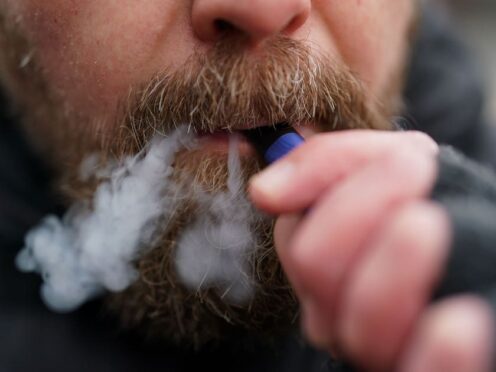New laws being considered by Holyrood could see the “beginning of the end” for single-use, disposal items in Scotland, campaigners have said.
MSPs will debate the Circular Economy (Scotland) Bill this week, and countryside charity the Association for the Protection of Rural Scotland (APRS) said including a requirement in the legislation for producers to take back items once they are no longer usable could “change the whole wasteful system”.
Charity director Kat Jones said such a measure could help tackle problems linked to single-use vapes.

Polling for the APRS shows 27% of Scots favour making producers primarily responsible for the costs of recycling or disposing of products once they are no longer in use.
Dr Jones said: “The idea of producer responsibility is at the very heart of good environmental economics, and the public opinion is ahead of the curve here.
“Take one example: disposable vapes. The waste and mess they lead to on our streets and in our countryside is obvious to everyone.
“Producers can only profit from them because the public purse and communities pick up the tab for dealing with the waste, which is incredibly hard to recycle.
“A requirement on producers to take them back once used would change the whole wasteful system.
“This principle could eventually apply to everything we buy and use.
“We can’t get there overnight, but these proposals could see the beginning of the end for our single-use economy, with some of the most damaging and wasteful products being first in line for change.
“The same change will also help drive product design in the direction of more durability and reliability, as well as cutting costs for local authorities.”

Amendments to the Bill, which will be debated on Tuesday and Wednesday, “move towards big business starting to pay its way”, the APRS said.
The legislation would also ban the disposal of unsold goods, preventing companies from sending products which have not been bought to landfill, with ministers to be given the power to set local recycling targets.
Other parts of the Bill could result in charges being brought in for single-use coffee cups, while car and van drivers could be fined if anyone is caught littering from their vehicle.
Householders could be issued with a fixed-penalty notice if they put the wrong items in their bins.
Calum Duncan, head of policy and advocacy at the Marine Conservation Society, said the Scottish Government should be adopting “ambitious take-back systems” for products such as batteries, packaging, electrical and electronic equipment, and even cars and vehicles once they are no longer in use.
He said: “We must speed up the transition towards a society where we reuse, repair, and recycle.
“Scotland’s seas are currently paying the price for drinks litter, with cans, bottles and lids recorded by our dedicated volunteers on 97% of UK beaches surveyed.
“We know policies like deposit return schemes, bans and charges on single-use plastics work, as our data has shown reductions in plastic carrier bags and cotton-bud sticks polluting our beaches.
“By now, we should have started to see the benefits of a deposit return system for drinks containers, but that simple measure remains on ice while we see what the next UK government decides to do.
“However, the Scottish Government was granted powers by UK legislation in 2020 to bring in ambitious take-back systems for other products, such as end-of-life vehicles, batteries, packaging, and waste electronic and electrical equipment, and this approach can be brought in now, without the kind of delay that has hampered delivery of a deposit return system.”
Phoebe Cochrane, sustainable economics officer at Scottish Environment Link, said: “Requiring businesses to take back products gives incentives to companies whose products last longer, are easier to collect back in and easier to refurbish or reuse.
“The Scottish Government have begun to talk about a requirement for producers to take their products back and manage them once used.
“Parliament now has a chance to put this principle into practice, to help build a future circular economy for Scotland, and to set priorities as we move towards reuse, refill and take-back schemes.”
A Scottish Government spokesperson said: “We want to create a circular economy, in which resources are kept in use for as long as possible. This is not just good for the environment – it will also create new economic opportunities and green jobs here in Scotland.
“The Circular Economy Bill will support Scotland’s transition to a zero-waste and circular economy, giving ministers and local authorities the tools they need to increase reuse and recycling rates, and modernise and improve waste and recycling services.”
